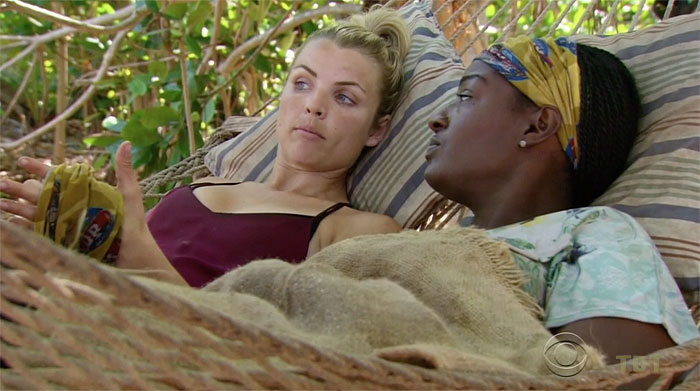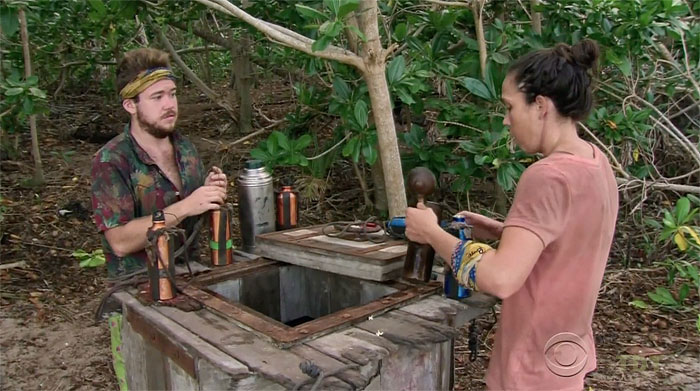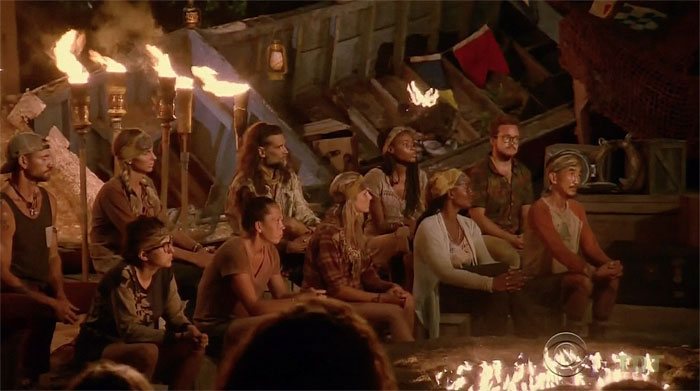

Andrea’s so dumb. I mean, why would she push to get rid of Zeke when she knows two things: First, her alliance would then only have a 5-4 advantage and, second, Sarah’s been known to jump alliances.
That opening paragraph pretty much sums up the argument of folks who believe Andrea made the wrong move. The opposite argument? Andrea is the absolute best. I mean, she knows Zeke’s a coming for her soon, so beat him to the punch at all costs.
When you really think about it, both sides make a whole lot of sense even though, in this case, neither side offers a perfect argument. Simply put, I don’t think Andrea could have made a great move either way.
But why did she choose to go the eliminate Zeke route? Some might argue it was simply the best decision she could make. When we make that case, though, it implies that rest of Andrea’s alliance – Michaela, Sarah, Cirie and Aubry – couldn’t simply tell Andrea they weren’t going along with the plan. We know that both Sarah, especially with her vote steal, and Cirie could have done something about the decision if they wanted. So why not?
This is where we should talk about the theory (or concept) of social stability. When sociologists study organizations (or even groups), they tend to do so with an eye toward social stability. What do I mean? Well, I’ll use my favorite example: In 1979, Columbia University sociologist Herbert Gans published Deciding What’s News. One of the most groundbreaking books of the then-nascent boon in media sociology research, the tome chronicles Gans’ participant observations of various newsrooms. Gans remained most interested in how journalists pick and choose news. Fundamentally, he wanted to understand news production processes. He implicitly argued that a lot of decisions made came from a need for stability and to avoid, essentially, unpredictability. Journalists value predictability in their routines.
And, as we all know, so do Survivor players. It’s easy to say that the core alliance in the game should have at least stayed together for one more vote and eliminated a member of the other four. Zeke obviously felt this made the most sense. But the rest of the five knew that Zeke couldn’t be trusted in the sense that at some moment, he was going to try and take over the game.

Castaways desire predictability. They want to trust the rest of the alliance or, at least, understand motivations. That way, when the time comes for a player to flip, the rest of the alliance understands why. Think about this from Andrea and Cirie’s perspective. They thought Zeke was with them, and he flipped and tried to take out Andrea.
For us at home, Zeke explained his reasoning: He basically wanted to be the center of the game and knew that his move against Andrea might not have been the brightest. If you’re Andrea and Cirie, this makes no sense intuitively, someone making a dubious move just because others seem to calling the shots. They knew he would do it again. To them, Michaela, Aubry and Sarah are just votes of sorts. Andrea and Cirie are running the game in their minds and to continue this level of stability, Zeke needed to go.
So while I feel like a lot of the attention surrounding last week’s vote rightly focuses on Andrea, too little examines why her alliance came together to do it. They craved social stability. They might not get it since Sarah’s doing a lot more talking with the other side than anyone understands, but, at the moment, I would say it was the right call.
And now, let’s talk about the remaining players individually:

- Michaela — I honestly have no idea where that burst of tears came from. Nothing we’ve seen from either this season or last would lead me to believe that Michaela was that close to Zeke. That makes me think one of two things happened: Either the narrative producers want to tell necessitated shortchanging that relationship, or Michaela’s two seasons, played very close together, are starting to get to her. Either way, I still don’t think Michaela can win this game.
- Sierra — OK, everyone here it comes: For the first time this season, I think Sierra’s playing a good game. The way she appeared willing to do anything to stay in the game makes her seem like someone to align with when needed. That could keep her in the game over someone like Troyzan. And if Sierra can make it to the end, she might see a whole lot of allies looking at her from the jury box.
- Tai — Before this week, I argued Tai was sitting in a great position. I mean, he still is considering we’re at final nine and he’s a challenge threat with two idols. But at some point, I want to understand why he didn’t think he needed to play an idol this week. Either he knew Zeke was going home and that means Tai is playing a killer game. Or, more than likely, his own alliance blindsided him and he didn’t see it coming. Last week should at least, hopefully for his sake, make it clear he’s at the bottom of his own alliance. We’ll see how Tai reacts.
- Aubry — For a long time, at least to me, it looked like Aubry wasn’t long for this game. But now, even if Sarah flips, Aubry appears to be in the best position: The last person picked off in her alliance and then someone to align with when the other alliance splinters. I’m actually liking her position right now. I’m probably dumb though.
- Cirie — Cirie is playing the best game of anyone out there. That’s what I think now and I’m sticking to it. While others look to be making power moves (i.e., Sarah or Andrea), all those moves happen only because of Cirie. Let’s hope she wins so we can indisputably call her a top-10 player of all time.
- Andrea — As I just said, I don’t think Andrea’s playing the best game of anybody on the island, but this is a constantly underrated player who, I hope, now gets a ton more respect for her all-around excellence. When you think of female players in the history of this game, I would argue that there aren’t many better triple threats. Oh sure, someone like Kim might be the best ever, but how many others have put on a such a great all-around display over the course of seasons? Let’s talk about that in the comments.
- Troyzan — After each episode, I think about who’s left in the game and what their future might have in store. And every week, I kind of forget about Troyzan a bit. We’re getting to the point where Troy needs to make some kind of move or he won’t be able to successfully argue his case in front of the jury. He’s done a great job staying under the radar – a decidedly weak spot for him last time – but at some point, he needs to move above the radar. Is that even an expression? Above the radar? You can be below, but can you be above? These things keep me up at night.
- Brad — While the edit understandably focused a whole lot on Zeke’s side of everything, we did see a little of Brad making some subtle moves at the reward. And next week’s preview shows us it might pay off. Either way, once again the edit is making Brad look good. I maintain he still owns a heck of a shot at winning this game.
- Sarah — I’m fairly confident, not just because of the preview for the next week, but just because I think I have a good read on Sarah the player, she’s going to flip again. I’ve been trying to think about a route Sarah could take to win the game. I’m coming up a bit empty. Any way she chooses, I think, she ends up sitting next to someone who could beat her. I do think Sarah is playing a good game and should be able to win in certain circumstances, but I’m not sure how it happens in this game with these players. Thoughts?
With that, I’m done for the week. Let’s talk next week … hopefully after another good episode.
 Pat Ferrucci started watching Survivor when Episode Two of Borneo first aired. He's seen every episode since. Besides recapping here, he'll be live-tweeting this season from the Mountain Time Zone. Why? Because nobody cares about the Mountain Time Zone except when they want to ski. Follow him @patferrucci for Survivor stuff and tweets about anything and everything that enters his feeble mind.
Pat Ferrucci started watching Survivor when Episode Two of Borneo first aired. He's seen every episode since. Besides recapping here, he'll be live-tweeting this season from the Mountain Time Zone. Why? Because nobody cares about the Mountain Time Zone except when they want to ski. Follow him @patferrucci for Survivor stuff and tweets about anything and everything that enters his feeble mind.
- S34 Well, in theory... index
- Cast: And the winner? I don't know?
- Eps.1-2: This cast is sure primed for fun
- Ep.3: Organize differently and boom, different culture
- Ep.4: Producers innovate, but it's unfortunately disruptive
- Ep.5: To compare or not to compare
- Ep.6: The drive to boot Sandra
- Ep.7: With the merge comes power rankings
- Eps.8-9: Booting Hali the rational choice
- Ep.10: Sarah revolts against dominance
- Ep.11: Don't rock the boat - we like it stable
- Ep.12: Do it and do it swiftly
- Ep.13: Where do we stand? A look at the Final 6
- Pre-Ep.14: Jury jeopardy